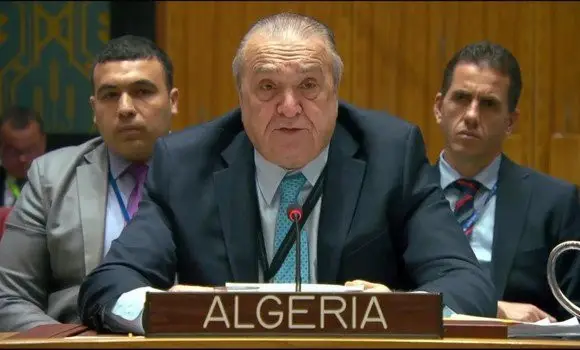By Riad Beladi
On 2 May 2025, Amar Bedjemaa was appointed as Algeria’s representative to United Nations and Algeria turn to be a member of the Security Council. His appointment was hailed as one of the most astute choices made by Algeria in recent years, signalling a renewed era of diplomatic engagement at the highest level. For those of us who have had the privilege of meeting him, this recognition comes as no surprise.
I personally met Amar Bedjemaa several times during his tenure as Algeria’s Ambassador to London. On each occasion, I was struck not only by his diplomatic acumen but also by his warmth and humility. One memorable encounter was during a pharmaceutical trade show in Algiers organised by our company, where his commitment to supporting Algerian initiatives abroad was evident. Another was in my role representing Algerians living in the UK and Ireland within the L’Assemblée Nationale des Algériens à l’Étranger — moments that highlighted his constant readiness to engage with and listen to the Algerian diaspora.
Algeria’s diplomacy is sophisticated and advanced, even when it does not share the same views as American policy. Yet, there is a curious similarity: both demonstrate resilience, clarity of purpose and an ability to shape global conversations. Where Washington leans on its political and economic weight, Algeria relies on principles, always defending the oppressed and raising issues others prefer to avoid.
Now, with Algeria holding a seat on the Security Council, we are certain to hear much more from its representatives. Amar Bedjemaa, together with Foreign Minister Ahmed Attaf, forms a formidable duo — respected not for bluster, but for the gravity of their words. They embody the essence of Algerian diplomacy: when they speak, people listen.
Recent developments underline the timeliness of Algeria’s role. Palestine has now been recognised by nearly every nation in the world and is on the path to full membership of the United Nations. Algeria has long been a steadfast advocate of Palestinian rights, never wavering in its support. For Amar Bedjemaa, this is not just a policy matter, but a continuation of Algeria’s historic role in giving voice to those struggling for freedom and dignity.
Diplomacy is often described as the art of balance. Algeria’s diplomacy, however, is rooted in conviction. It refuses to be silent in the face of injustice and does not indulge in empty symbolism. It is this authenticity that will make Algeria’s presence on the Security Council not only valuable, but essential in shaping debates about peace, justice and fairness.
Looking ahead, Amar Bedjemaa’s charisma and gentlemanly style, combined with Ahmed Attaf’s deep experience, will ensure that Algeria remains a central player on the international stage. Their voices remind us that diplomacy, when carried with dignity, has the power to move nations and protect the vulnerable.
In Amar Bedjemaa, Algeria has not simply appointed a diplomat. It has reaffirmed its commitment to a diplomacy of principle, and to a world where truth, spoken with conviction, still commands respect.


